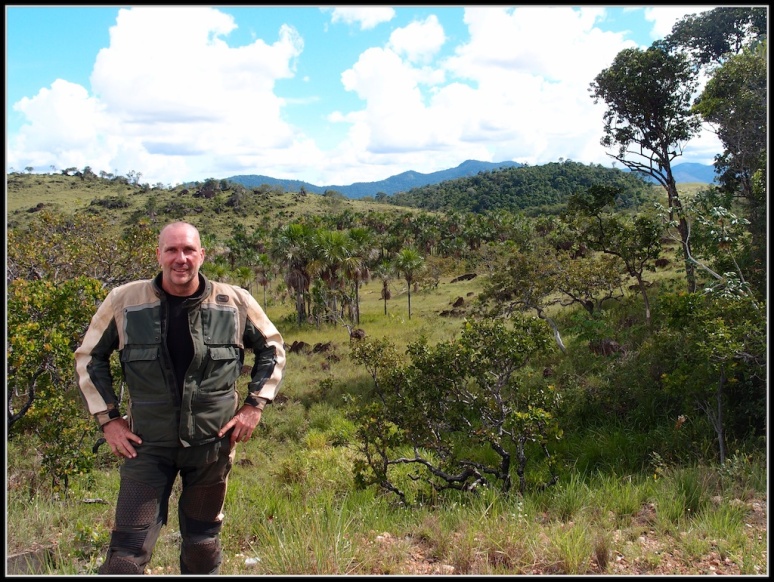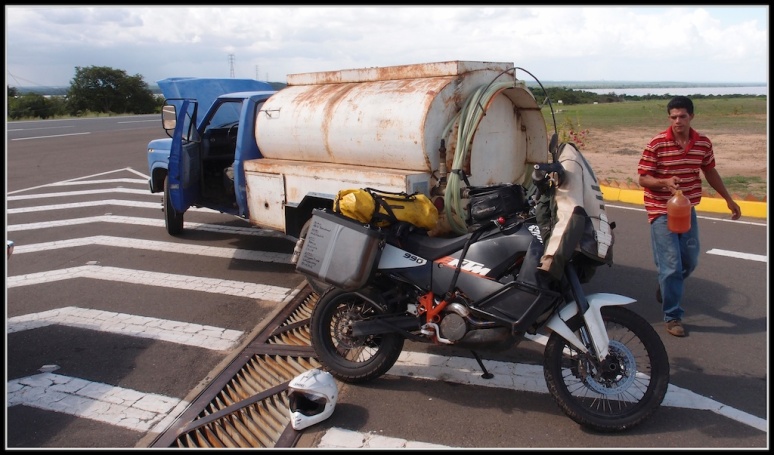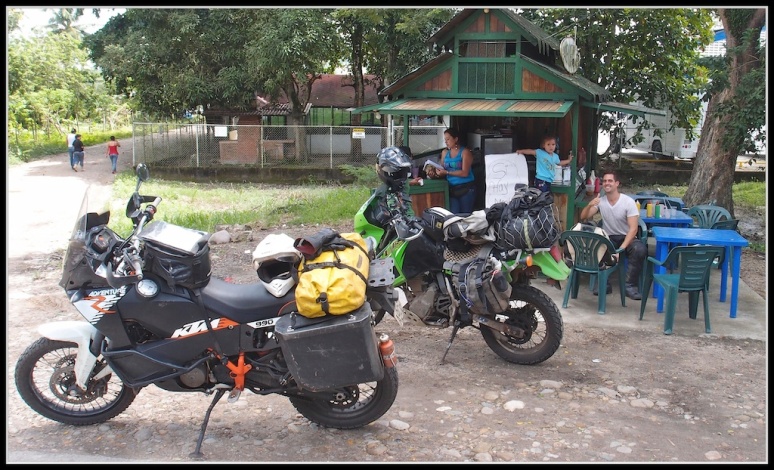Through Venezuela to Bogota
Ok , Guillaume and I leave Manaus in a hurry since I feel a tad uneasy about ripping out the gate to get my bike back. North it is for 2 days, basically a straight highway through rain forest and indigenous reservoirs with big signs saying: ‘Please no stopping, photos, videos, rubbish, hunting.’ Damn, I so wanted to hunt a jaguar with my leatherman. I see small groups of indians walking along the road with spears and bow and arrows, sorry no photos. Guillaume leads, sitting at around 120 km/h max. It’s driving me nuts, I need to get used to it though since we’ll be riding together for the next 9 days. This is a straight highway, good surface, no traffic, I’d be cruising at 150+ km/h. I get used to it though but still try to push him with questions like: At what speed is the old lady red lining? You got good wind protection? What’s her max speed? Fuel economy ok at higher speeds? This quality choice of questions adds another 5 km/h to our cruising speed. At our first lunch stop I notice I really enjoy his company, we talk about bikes, girls, past experiences and more bikes. Man stuff. Nice.
Lunch stop:
Further north the landscape gets less bushy and some cattle farms appear:
We cross the border to Venezuela. Easy. Except Guillaume needs to come back the next morning and buy bike insurance to get the custom temporary import paper. I on the other hand present my health insurance paper that has the beautiful word ‘Worldwide’ printed on it and it gets accepted as my bike insurance, like at all the other border crossings before. We stay the night at the border town, buy fuel from the receptionist since border towns are not allowed to sell fuel to foreigners. Talking about fuel in Venezuela, this is heaven. The best quality fuel in the whole of south america at a price of 3 cents a liter. Yes, 3 cents. Practically we fill up 2 bikes and pay one dollar. This creates the perfect environment for big, old cars and trucks from the 60’s to keep running. Venezuela is known for it’s top mechanics because of that. One more thing, money. Venezuela’s Bolivar has an official exchange rate and a street exchange rate for american dollars which is more than twice as much. The key is to bring cash dollars into Venezuela, change them on the street or in shops and get twice as many Bolivars then from a cash machine or bank. Only problem is it’s illegal to bring cash into the country and police do search for it. I hide my dollars inside my helmet and can highly recommend that technique.
The roads are good and twisty, cutting through beautiful scenery over mountains and through valleys. Magic.
We stay the night in a small town along the road, have pizza from the local bakery and sit outside at the main square. Talking to a man, we’re back to spanish now, and being amongst the town life at this evening gives me the impression that the people here are the most ‘down to earth’ people I’ve met in the whole of South America. The man shares his views on politics with me and finishes our conversation with a sentence that sticks with me: ‘My heart for my country is broken in two halves: the one half loves this country and its people, loves the way we live our lives with passion and compassion for both. The other half hates to see where this country goes, with more and more criminals on the street and in power.’ He gives me the names of a few villages along the way where I under no circumstances should stop, not even at a red light. When we ride through those places I understand. It’s rough.
We follow the highway the next day and have a little break just before a huge bridge:
20 min later we stop for lunch, bbq chicken, ask the guy how far the next petrol station is since we’re both running low on fuel. ‘2 hours your way or 45 min back.’ We’re not gonna make it to the next one, we have to go back. Man how I hate this. Coming back to the bridge I notice a small fuel truck parked on the side. I pull over and see Guillaume disappearing into the horizon. I ask the guy for fuel and he helps me out, fills both tanks to the rim. Thanks mate.
I carry on and not far I see Guillaume parked, waiting for me. We never discussed this kind of situation and he instinctively did the right thing: waiting. We turn around, stop at the truck and fuel up Guillaume’s bike too.
From here on we follow the highway west until we get to the border with Colombia. Last stop in Venezuela:
We cross the border into Colombia at Cucuta on a sunday. Bad. We never thought about it but the customs office is closed on weekends. When we leave the customs area a cop pulls me over after he missed Guillaume and insists that I go back to Venezuela and come back tomorrow to get the customs papers. ‘Ok, he wants money’ I think. ‘But you’d also be the first cop in south america that I actually give some, so no!’ 10 min of ‘no intendo, no habla espaniol’ and he lets me go to the nearest hotel where Guillaume waits, not without making sure I understand that there is police controls everywhere and I won’t get far without the papers. This is the worst place I ever spent a night in. The hotel is ok, very cheap, but the village is dirty and looks dangerous, only tumbling weed is missing from the scene. We go out for diner, leave phones, credit cards and camera behind, and witness a street fight right in front of our dining table. This is a place, no the mother of all places to get away from as fast as possible. Next morning we get our papers fast, thanks to Guillaume who also works at customs back in Canada.
At the customs building. I notice a big sign over the entrance saying: ‘Temporary import papers are free of charge. Do not pay any money to the officer.’ Good to know but also a sign that bribery might be quite common in Colombia. Not so as I learn later on my trip.
We get some money in Cucuta since Venezuela left us both stranded for cash and head west towards Bogota until we run out of daylight. Next morning after breakfast we start riding on what is going to be one of the best rides ever. 400 kms of twisty road with good surface following the foot of a mountain range. Then up the mountain to a height that asks for more clothes and hot soup. Like here:
Then down again it gets warmer and beautiful mountain jungle appears:
And up again and into Bogota we go. Cold, big city with noticeably less oxygen. It takes me a few days to adjust. Guillaume organizes the sale of his bike and his flight back home. Ciao my friend, I really enjoyed your company and who knows, maybe one day …













